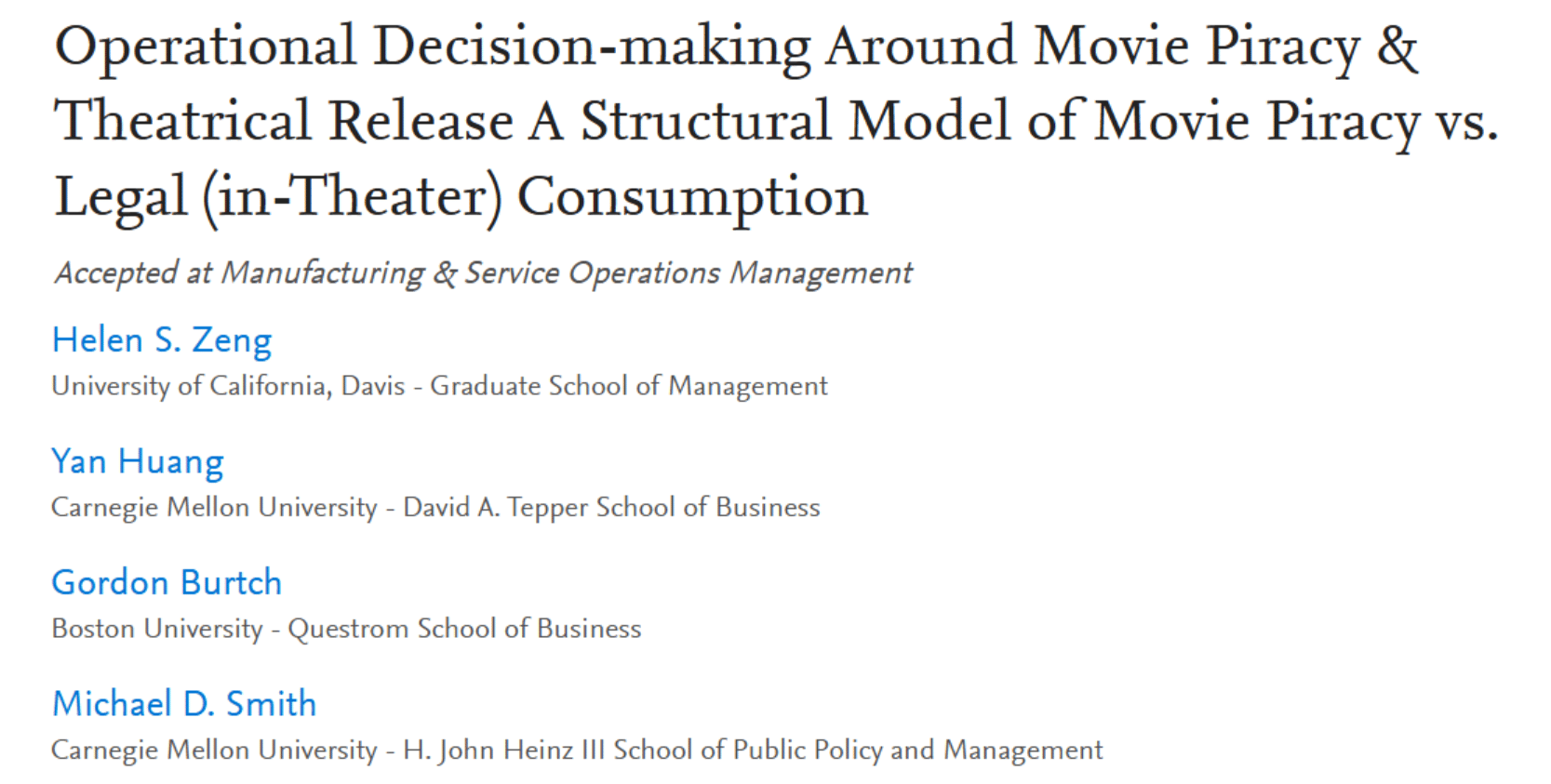Prevailing wisdom states that the movie industry can’t compete with “free” but a new academic study suggests this notion is only half right. Researchers found that competing on price is indeed a losing strategy. However, movie theaters can certainly lure pirates back to the big screen by improving the quality of the theater experience.
From: TF, for the latest news on copyright battles, piracy and more.
 There’s a common belief that people pirate content to save money, whether on another streaming subscription or a pricey box office ticket.
There’s a common belief that people pirate content to save money, whether on another streaming subscription or a pricey box office ticket.
That said, movie theaters still draw millions of visitors, many of whom may also turn to pirate sites occasionally.
Since piracy isn’t going away, understanding what drives a person to choose the theater over a ‘free’ pirate option, and vice versa, is crucial for the industry.
A new paper aims to take on this task. Through a structural econometric model that relies on real-world data from 2014 to 2019, it tries to quantify the choice between the movie theater and piracy. It considers the quality of piracy releases, but also the price and quality of the movie theater experience.
Accepted peer-reviewed paper
The study was conducted by researchers from Carnegie Mellon University, the University of California, Davis, and Boston University. The paper will be published in the Manufacturing & Service Operations Management journal, but an early copy was already published through SSRN, which allows us to take a look at the results.
Instead of conducting surveys to model consumer behavior, the researchers use official box office figures, demographic data, and piracy data, covering both volume and quality, differentiating between low-quality (e.g. CAM) and high-quality (e.g. HDRip) releases.
Through a series of simulations, the researchers looked at what types of movie industry interventions could help to address the piracy challenge and which ones proved futile.
HDRips Are a Bigger Threat than CAMs
The study largely confirms the intuitive notion that quality matters. If high-quality pirated copies are available within a week of a movie’s theatrical release, it leads to an average 7.9% reduction in box office revenue over the first 8 weeks, compared to a scenario where only low-quality “cam” rips are available.
This finding isn’t all that surprising. After all, high-quality releases are much more popular among pirates, resulting in many more downloads and streams. This logically draws more people away from the box office.
Interestingly, the paper shows that the revenue decrease caused by high-quality piracy is most problematic for “smaller-grossing” movies. Films that earn between $100M-$200M face a 9.4% revenue loss, which is more than double the 4.3% loss for blockbusters.
“This result implies that high-quality unauthorized content may hurt creativity in film production in the motion picture industry, as it does greater harm to smaller-budget movies and independent movies,” the paper reads.
Box Office Discounts Are Not the Answer
Pirates often cite high costs as a reason to pirate, so it would seem to make sense that lower prices reduce piracy rates. Indeed, that is what the researchers found. However, lower prices eventually reduce overall revenue, so that’s not the answer.
The researchers found that cutting box office prices by 10% reduces overall revenue by 4.6%, as the increase in sales doesn’t cover the per-ticket loss. Similarly, efforts to reduce travel costs by increasing the number of screens had no meaningful effect either.
“Based on our results, we argue that theaters and/or studios can not effectively compete against “free” by reducing the costs of consuming legal content in the theatrical channel,” the researchers note.
Competing on Quality Works
Instead of competing on price, it appears movie theaters are better off competing on quality; investing in better seating, improved audio-visual technology, or other theater features, for example.
The study’s simulations show that a “modest improvement” in the quality of the movie theater experience can completely evaporate the negative effects of early high-quality piracy releases.
Specifically, the researchers found that a 3.7% increase in the consumer’s preference (utility) for the theater experience is enough to fully offset the 7.9% revenue loss.
“We therefore recommend that theater chains and studios prioritize investments in upgrading equipment and in-theater technologies to create a more immersive, comfortable, and engaging environment,” the paper concludes.
The study’s findings offer a clear opportunity for the movie industry. While theaters can’t compete with ‘free’, they can win by offering a premium experience that pirates can’t replicate.
A copy of the forthcoming paper, which discusses several additional findings and methodological limitations, is on SSRN.
—
Zeng, Helen and Huang, Yan and Burtch, Gordon and Smith, Michael D., Operational Decision-making Around Movie Piracy & Theatrical Release A Structural Model of Movie Piracy vs. Legal (in-Theater) Consumption (October 08, 2025). Accepted at Manufacturing & Service Operations Management.
From: TF, for the latest news on copyright battles, piracy and more.
 Die Nexperia-Chipkrise in der Automobilindustrie neigt sich dem Ende. Die Politik arbeitet weiter an langfristigen Lösungen. (Auto, Prozessor)
Die Nexperia-Chipkrise in der Automobilindustrie neigt sich dem Ende. Die Politik arbeitet weiter an langfristigen Lösungen. (Auto, Prozessor)  Wie misst man die Qualität von KI-generiertem Code? Mit virtuellen Toren, die die Code nur durchlassen, wenn er bestimmte Kriterien erfüllt. Von Klaus Manhart (
Wie misst man die Qualität von KI-generiertem Code? Mit virtuellen Toren, die die Code nur durchlassen, wenn er bestimmte Kriterien erfüllt. Von Klaus Manhart ( Retro-Spiele liegen im Trend und erscheinen immer öfter in Versionen für die Hardware von damals. Wir haben uns fünf tolle Beispiele angesehen. Von Sönke Siemens und Benedikt Plass-Fleßenkämper (
Retro-Spiele liegen im Trend und erscheinen immer öfter in Versionen für die Hardware von damals. Wir haben uns fünf tolle Beispiele angesehen. Von Sönke Siemens und Benedikt Plass-Fleßenkämper ( Vom API-Plattform-Betrieb über Netzwerksicherheit im Ministerium bis zur IT-Abteilungsleitung am Forschungsinstitut - diese Positionen bieten technologische Tiefe und strukturelle Verantwortung. (
Vom API-Plattform-Betrieb über Netzwerksicherheit im Ministerium bis zur IT-Abteilungsleitung am Forschungsinstitut - diese Positionen bieten technologische Tiefe und strukturelle Verantwortung. ( There’s a common belief that people pirate content to save money, whether on another streaming subscription or a pricey box office ticket.
There’s a common belief that people pirate content to save money, whether on another streaming subscription or a pricey box office ticket. 
 Google setzt bei Bundesliga und Champions League auf KI-generierte Liveticker. Das Ergebnis gehört vom Platz gestellt. (
Google setzt bei Bundesliga und Champions League auf KI-generierte Liveticker. Das Ergebnis gehört vom Platz gestellt. ( Technische Pannen, Verzögerungen und Prototypen statt einsatzbereiter Systeme: Die Ausstattung der Bundeswehr mit Kamikazedrohnen stockt massiv. (
Technische Pannen, Verzögerungen und Prototypen statt einsatzbereiter Systeme: Die Ausstattung der Bundeswehr mit Kamikazedrohnen stockt massiv. ( Der Tech-Sektor hat den stärksten Einbruch seit sieben Monaten erlebt. Acht KI-fokussierte Konzerne büßten fast 800 Milliarden US-Dollar Börsenwert ein. (
Der Tech-Sektor hat den stärksten Einbruch seit sieben Monaten erlebt. Acht KI-fokussierte Konzerne büßten fast 800 Milliarden US-Dollar Börsenwert ein. ( Der Verdacht, dass OpenAI die Google-Suche für ChatGPT-Anfragen verwendet, wird durch diese Erkenntnisse erhärtet. (
Der Verdacht, dass OpenAI die Google-Suche für ChatGPT-Anfragen verwendet, wird durch diese Erkenntnisse erhärtet. (